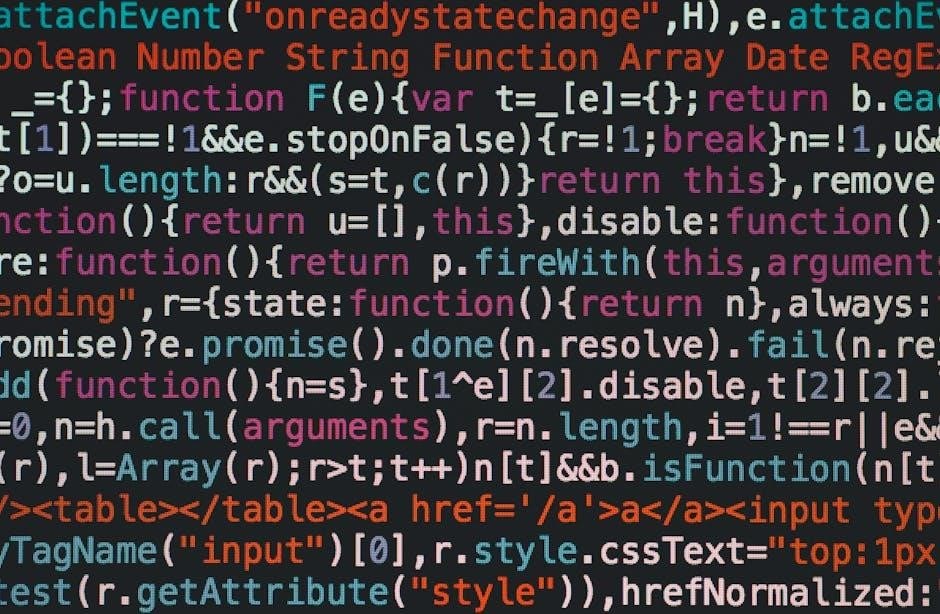Cracking the Coding Interview by Gayle Laakmann McDowell is a comprehensive guide offering 189 programming questions and solutions. Tailored for aspiring developers, it provides insights into company-specific interview practices, such as those at Google, Amazon, and Facebook. The 6th edition emphasizes best practices, including the concept of Best Conceivable Runtime (BCR), and practical tips for mastering technical interviews.
Overview of the Book and Its Importance
Cracking the Coding Interview is a comprehensive guide for tech professionals preparing for coding interviews. Authored by Gayle Laakmann McDowell, the 6th edition provides 189 programming questions and detailed solutions. It bridges the gap between academic knowledge and real-world interview expectations, offering insights into company-specific practices and common algorithms. The book is widely recognized as a go-to resource for mastering technical interviews, covering topics like resume optimization, behavioral questions, and system design. Its practical strategies and industry-tested advice make it indispensable for anyone aiming to excel in the competitive tech job market.
Author Background: Gayle Laakmann McDowell
Gayle Laakmann McDowell is a renowned expert in tech career development. She founded CareerCup, a platform offering resources for interview preparation. McDowell has conducted numerous interviews at top companies like Google and Microsoft, providing her with deep insights into the technical hiring process. Her work extends beyond Cracking the Coding Interview, including books like Cracking the PM Interview and Cracking the Tech Career. Her passion for education and mentorship has made her a trusted advisor for aspiring developers and professionals navigating the competitive tech industry.
Key Features of the 6th Edition
The 6th edition of Cracking the Coding Interview introduces updated content tailored for modern technical interviews. It includes over 189 programming questions with detailed solutions, focusing on algorithms, data structures, and system design. The book emphasizes the concept of Best Conceivable Runtime (BCR) and provides insights into company-specific practices. New sections cover emerging trends in tech interviews, while revised chapters on resume optimization and soft skills offer a holistic approach; Practical tips for Google, Amazon, and Facebook interviews are included, making it a must-have resource for aspiring developers aiming to excel in competitive tech roles.

The Interview Process
The technical interview workflow involves multiple rounds, including HR screening, programming challenges, and system design evaluations. Companies assess problem-solving skills, coding proficiency, and communication abilities, ensuring candidates meet high standards for technical roles.
Understanding the Technical Interview Workflow
The technical interview workflow typically begins with an HR screening to assess basic qualifications. Candidates then progress to programming challenges, often involving algorithmic problems. System design evaluations follow, testing architectural skills. Companies use these rounds to evaluate problem-solving abilities, coding proficiency, and communication. The process is rigorous, with a focus on identifying candidates who can handle real-world challenges. Most firms adhere to similar structures, ensuring consistency in evaluating technical competence and cultural fit. This workflow is designed to simulate on-the-job scenarios, helping employers gauge a candidate’s potential to succeed in their role.
Types of Interviews: HR, Programming, and System Design
Interviews in the tech industry are categorized into three main types: HR, programming, and system design. HR interviews focus on cultural fit and soft skills, ensuring alignment with company values. Programming interviews assess coding abilities through algorithmic challenges. System design interviews evaluate a candidate’s capacity to architect scalable solutions. Each stage serves a distinct purpose, providing a holistic view of a candidate’s capabilities. Understanding these types helps prepare effectively, ensuring a smooth journey through the hiring process for technical roles.
Expectations and Standards in Coding Interviews
Coding interviews have clear expectations and standards to assess technical proficiency. Candidates are expected to write clean, efficient, and correct code on a whiteboard or shared document. Problem-solving skills under time constraints are crucial, with a focus on optimal algorithms. Communication is key; explaining thought processes and design decisions is often evaluated. Familiarity with common data structures and algorithms is assumed, as well as the ability to handle edge cases. Demonstrating confidence and clarity in problem-solving approaches significantly influences outcomes, ensuring alignment with the technical demands of the role.

Resume and CV Tips
Cracking the Coding Interview emphasizes the 10-second rule for resumes, ensuring clarity and relevance. Tailor your resume to highlight technical skills, brevity, and impact, avoiding unnecessary details. Use clean formatting and focus on achievements rather than duties to stand out to recruiters and hiring managers in the competitive tech industry.
The 10-Second Rule for Resumes
The 10-second rule for resumes, as highlighted in Cracking the Coding Interview, emphasizes brevity and clarity. Recruiters often spend only a few seconds reviewing a resume, so it’s crucial to ensure that key information stands out immediately. Avoid lengthy paragraphs and focus on bullet points that highlight technical skills, achievements, and relevant experience. Use action verbs and quantify accomplishments where possible. This approach ensures that your resume is both impactful and easy to scan, increasing the likelihood of catching the recruiter’s attention in a competitive job market; Clean formatting and relevance are equally important to make a strong first impression.
Optimizing Your Resume for Technical Roles
Optimizing your resume for technical roles involves tailoring it to highlight relevant skills and experiences. Use specific keywords from job descriptions to align with applicant tracking systems (ATS). Quantify achievements, such as “Improved algorithm efficiency by 40%,” to demonstrate impact. Include technical details like programming languages, tools, and projects. Avoid generic descriptions and focus on problem-solving skills. Ensure the resume is concise, ideally one page, and free of irrelevant information. Use a clean format with clear sections for education, work experience, and skills. Tailor your resume for each application to emphasize the most relevant qualifications and experiences, making it stand out in competitive tech roles.
Programming Skills and Best Practices
Mastering programming languages like Python and Java is essential. Focus on understanding data structures, algorithms, and problem-solving techniques. Practice coding efficiently and logically, emphasizing clean and readable code. Follow best practices for debugging and testing to ensure robust solutions. Develop skills in problem decomposition and optimal algorithm design, aiming for the Best Conceivable Runtime (BCR). Regularly review common interview questions and practice whiteboarding to improve communication of technical ideas during interviews. Stay updated with industry trends and technologies to remain competitive in technical roles.
Mastering Programming Languages for Interviews
Cracking the Coding Interview emphasizes the importance of proficiency in programming languages such as Python, Java, and C++. Focus on understanding syntax, libraries, and common pitfalls. Practice solving problems efficiently, leveraging language-specific features. Develop a strong foundation in data structures and algorithms, as they are frequently tested. Regular coding exercises and problem-solving drills are crucial. Additionally, familiarize yourself with language nuances and best practices for clean, readable code. This mastery enhances your ability to tackle technical challenges during interviews confidently and effectively, aligning with the standards expected by top tech companies.
Best Conceivable Runtime (BCR) and Its Significance
Best Conceivable Runtime (BCR) refers to the optimal runtime achievable for a given problem, focusing on minimizing both time and space complexity. It emphasizes identifying the most efficient algorithm to solve a problem, ensuring solutions are performant under constraints. Understanding BCR is crucial in interviews, as it helps candidates deliver solutions that meet high performance standards. By striving for BCR, developers can create solutions that scale efficiently, which is particularly important in high-stakes technical interviews and ensures robust performance.
Common Algorithms and Data Structures to Focus On
Mastering specific algorithms and data structures is essential for interview success. Focus on arrays, linked lists, stacks, queues, trees, binary search trees, heaps, and graphs. Hash tables are also critical for efficient lookups. Sorting algorithms like quicksort and mergesort, along with searching techniques, are fundamental. Dynamic programming, greedy algorithms, and bit manipulation are frequently tested. Understanding recursion and its applications is vital. These data structures and algorithms form the foundation of most interview problems, allowing candidates to solve them efficiently and effectively. Regular practice with these concepts ensures readiness for technical challenges.

Common Interview Questions and Solutions
Top programming questions include problems like reversing linked lists, binary tree traversals, and array manipulations. Solutions often require optimizing for runtime and space complexity, leveraging concepts like two pointers or hash maps. Practice is key to mastering these challenges efficiently and effectively, ensuring problem-solving skills are sharp during interviews.
Top Programming Questions Asked in Interviews
Top programming questions often involve common data structures like arrays, strings, and linked lists. Problems such as reversing a linked list, finding duplicates in an array, or validating a palindrome are frequent. Interviewers also focus on binary tree operations, including traversals and level-order traversal. Additionally, dynamic programming questions, such as the classic “house robber” problem, and system design concepts are frequently tested. These questions assess problem-solving skills, algorithmic thinking, and the ability to write clean, efficient code under pressure. Practice these common problems to build confidence and improve coding interview performance.
Approaches to Solving Algorithmic Problems
Effective approaches to solving algorithmic problems involve understanding the problem deeply, identifying key constraints, and selecting the right data structures. Start by breaking down the problem into smaller subproblems and consider edge cases. Use techniques like brute force to find a solution, then optimize for efficiency. Dynamic programming and greedy algorithms are powerful tools for complex problems. Practice iterative refinement to improve solutions. Additionally, focus on writing clean, readable code and communicating your thought process clearly. These strategies help build confidence and improve problem-solving skills, essential for success in technical interviews.
Optimizing Solutions for Better Performance
Optimizing solutions for better performance involves refining algorithms to reduce time complexity and space usage. Start by identifying bottlenecks and simplifying operations. Techniques like memoization, caching, and dynamic programming can significantly improve efficiency. Iterative refinement is key—begin with a brute-force approach, then enhance it. Consider trade-offs between time and space complexity. Always test edge cases to ensure robustness. Clean, modular code not only performs better but also enhances readability. By focusing on optimal data structures and minimizing unnecessary computations, you can develop solutions that scale effectively and impress interviewers with their efficiency and clarity.
Behind the Scenes of Technical Interviews
Most companies conduct interviews similarly, but tailor processes to their needs. Google, Amazon, and Facebook emphasize unique approaches, blending technical and cultural assessments to evaluate candidates.
How Companies Conduct Interviews
Most companies follow a structured interview process tailored to their needs. Typically, it begins with phone screens or coding challenges, followed by on-site interviews. Google, Amazon, and Facebook emphasize unique approaches, blending technical assessments with cultural fit evaluations. Interviews often include problem-solving, system design, and behavioral questions. Companies prioritize understanding a candidate’s thought process and communication skills. Tools like LeetCode are commonly used for coding assessments. The process aims to evaluate both technical expertise and alignment with company values, ensuring candidates are well-suited for the role and team dynamics. Each company adapts these methods to reflect their specific culture and requirements.
Insights into the Interviewer’s Perspective
Interviewers primarily assess problem-solving skills, communication, and cultural fit. They evaluate how candidates approach challenges, not just correct answers. Gayle Laakmann McDowell highlights that confidence and clarity in explaining thought processes are critical. Interviewers seek candidates who can think aloud, break down problems methodically, and demonstrate adaptability. They also look for passion for coding and teamwork, as these traits indicate long-term potential. Feedback during interviews is often used to gauge how candidates improve under pressure. The goal is to identify individuals who can thrive in real-world scenarios, balancing technical proficiency with interpersonal skills, ensuring they align with the company’s collaborative environment and values.
Preparing for Different Company Cultures
Understanding company cultures is vital for interview success. Research each firm’s values, work environment, and expectations; For example, Google emphasizes collaboration and scalability, while Amazon focuses on customer obsession and ownership. Facebook, meanwhile, values open communication and impact-driven work. Smaller startups may prioritize cultural fit and adaptability over strict technical criteria. Tailor your approach to align with these values, showcasing relevant experiences. Gayle Laakmann McDowell advises candidates to demonstrate how they thrive in specific environments, ensuring alignment with the company’s mission and team dynamics. This preparation helps candidates stand out and signal they are a strong long-term fit for the organization.
Soft Skills and Behavioral Questions
Soft skills like communication, teamwork, and problem-solving are crucial. Behavioral questions assess how candidates handle challenges, demonstrating adaptability and interpersonal abilities essential for team collaboration and career growth.
The Role of Communication in Interviews
Effective communication is critical in interviews, showcasing not only technical skills but also the ability to collaborate. Candidates must clearly articulate their thought process, ensuring interviewers understand their problem-solving approach. Active listening is equally important, as it demonstrates engagement and adaptability. Communicating complex ideas in a simple, structured manner builds confidence and trust. Avoiding unnecessary jargon and maintaining a professional tone enhances credibility. Strong communication skills highlight teamwork and leadership potential, making candidates stand out in a competitive environment.
Handling Behavioral Questions Effectively
Behavioral questions assess how candidates handle real-world scenarios, revealing problem-solving skills and cultural fit. Using the STAR method (Situation, Task, Action, Result) to structure responses ensures clarity and coherence. Interviewers seek examples showcasing teamwork, leadership, and resilience. Candidates should practice articulating past experiences, focusing on their role and the positive outcome. Demonstrating initiative and a growth mindset is crucial. Avoid generic answers; instead, provide specific, relevant anecdotes. Preparation is key to confidently addressing these questions, which often determine a candidate’s alignment with the company’s values and culture.
Building Confidence for Technical Interviews
Confidence is crucial for acing technical interviews, as it impacts both performance and perception. Candidates should practice consistently, focusing on problem-solving and communication skills. Mock interviews and coding challenges help familiarize oneself with the interview environment. Understanding common algorithms and data structures boosts readiness. Additionally, researching the company and practicing whiteboarding exercises can reduce anxiety. Emphasizing strengths and past successes mentally prepares candidates. Remember, confidence stems from preparation and self-belief, enabling candidates to tackle challenges effectively and present themselves as capable problem solvers.
Practice and Preparation Strategies
Effective practice involves solving coding problems on platforms like LeetCode and HackerRank; Regularly reviewing common algorithms and data structures is essential. Utilize online resources and books.
Effective Ways to Practice Coding
Consistent practice is key to mastering coding interviews. Focus on platforms like LeetCode, solving problems daily. Target common algorithms and data structures such as binary trees and graphs. Regularly review past mistakes to improve. Practice whiteboarding to simulate real interviews. Join online communities for support and feedback. Time management is crucial; simulate interview conditions. Use resources like Cracking the Coding Interview for guided preparation. Stay persistent and track progress to refine your skills effectively.
Using Online Resources for Interview Prep
Leverage online platforms like LeetCode, HackerRank, and CodeSignal to practice coding challenges. Utilize Cracking the Coding Interview’s GitHub repository for PHP implementations of common algorithms. Explore forums like Reddit and Stack Overflow for problem-solving insights. Visit CareerCup for mock interviews and tips. These resources provide structured practice, helping you master data structures and optimize solutions. Regularly review problem sets and participate in coding communities to refine your skills and gain confidence for technical interviews. Consistent practice with these tools ensures you’re well-prepared for any coding challenge.
Time Management Techniques for Interviews
Effective time management is crucial during coding interviews. Allocate 1-2 minutes to fully understand the problem before coding. Spend 5-10 minutes planning an optimal solution. Dedicate the remaining time to writing clean, efficient code. Practice mock interviews to refine your pacing. Use techniques like Best Conceivable Runtime (BCR) to quickly assess problem complexity. Prioritize solving easier parts first to secure partial points. Review your code within the last few minutes to catch errors. Regular practice with timed exercises helps build confidence and ensures you maximize your performance under pressure. Mastering these strategies is key to acing technical interviews.

Company-Specific Tips
Research the company’s interview style and focus on their common problem types. Practice systems design for larger firms and algorithmic questions for tech giants.
Cracking Interviews at Google
Google interviews focus heavily on problem-solving and technical skills, often involving complex algorithmic and system design questions. Candidates should be well-versed in data structures and algorithms. Practicing whiteboarding exercises can help simulate real interview conditions. Gayle Laakmann McDowell emphasizes understanding the problem deeply before coding. Behavioral questions also play a role, assessing how candidates think and collaborate. Mock interviews and thorough preparation are essential. Persistence is key, as Google’s process can be rigorous. Staying calm and communicating clearly during interviews can significantly improve chances of success.
Preparing for Microsoft and Amazon Interviews
Microsoft and Amazon interviews emphasize technical depth and problem-solving under pressure. For Microsoft, practice coding challenges on platforms like LeetCode and focus on system design. Amazon prioritizes behavioral questions aligned with its leadership principles. Both companies value clear communication of thought processes. Gayle Laakmann McDowell recommends mastering algorithms and data structures, while also understanding software design patterns. Mock interviews tailored to each company’s style are crucial. Time management and optimizing solutions are key, as interviewers assess both correctness and efficiency. Thorough preparation and a strategic approach significantly enhance success rates in these competitive environments.
Understanding Facebook’s Interview Process
Facebook’s interview process is rigorous, focusing on technical skills, problem-solving, and cultural fit. Candidates typically undergo multiple rounds, including phone screens and onsite interviews. The process emphasizes coding challenges, system design, and behavioral questions. Gayle Laakmann McDowell highlights the importance of preparing for scenarios tailored to Facebook’s products and services. Practicing with real-world problems and understanding the company’s priorities, such as scalability and user impact, is crucial. Communication skills are also evaluated, as Facebook values collaboration. Mock interviews and thorough preparation are essential to navigate this competitive process successfully.
Additional Resources
Cracking the Coding Interview recommends books like The Google Resume and online platforms such as LeetCode for practice. Joining communities like CareerCup and GitHub repositories provides valuable resources, enabling candidates to refine their coding skills and network with professionals. These tools offer a comprehensive approach to interview preparation and continuous learning.
Recommended Books for Interview Prep
by Cormen, Leiserson, and Rivest is a must-read for mastering algorithms. These books, along with online platforms like LeetCode, form a comprehensive toolkit for aspiring developers aiming to excel in coding interviews and land top tech roles. They complement the strategies outlined in Cracking the Coding Interview, ensuring a well-rounded preparation approach.
Online Communities and Forums for Support
The Cracking the Coding Interview community extends beyond the book, with online forums and groups offering valuable support. GitHub repositories provide access to shared solutions and collaborative coding projects. LeetCode and similar platforms host discussions and challenges to hone skills. Reddit communities, such as r/cscareerquestions, and Stack Overflow offer peer feedback and advice. Additionally, forums like CareerCup, founded by the author, provide insights and resources for interview preparation. These online spaces foster collaboration and learning, helping aspirants refine their coding abilities and gain confidence for technical interviews.
Practice Platforms for Coding Interviews
LeetCode, HackerRank, and CodeSignal are top platforms for coding interview practice, offering extensive libraries of problems. LeetCode focuses on algorithmic challenges, while HackerRank covers diverse programming domains. CodeSignal provides real-world interview simulations and advanced assessment tools. These platforms align with Cracking the Coding Interview concepts, helping candidates refine their coding skills. Regular practice on these sites builds problem-solving speed and accuracy, essential for technical interviews. Additionally, they offer forums and resources to track progress and learn from peers, making them indispensable for interview preparation.
Persistence and continuous practice are key to cracking coding interviews. Building confidence, mastering algorithms, and staying resilient will guide you to success in your tech career journey.
Final Tips for Success
Persistence and continuous learning are essential for success in coding interviews. Mastering problem-solving approaches and maintaining confidence are vital. Utilize resources like Cracking the Coding Interview and diverse online platforms to refine your skills. Regular practice builds problem-solving muscle, preparing you for various scenarios. Understand company-specific practices and stay adaptable. Each interview is a learning opportunity, and persistence is crucial for securing your desired role in the competitive tech industry.
The Importance of Persistence in the Job Search
Persistence is a cornerstone of success in the job search. Gayle Laakmann McDowell emphasizes that technical interviews are challenging, but consistent effort leads to improvement. Every interview, regardless of outcome, provides valuable experience. Candidates should view rejections as learning opportunities rather than setbacks. Building resilience and maintaining a growth mindset are key. Regular practice and leveraging resources like Cracking the Coding Interview strengthen problem-solving skills. Persistence ensures long-term success in securing a fulfilling tech role.
